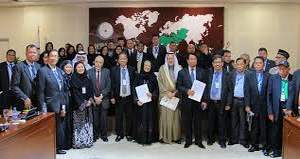From the Website of OPPAP
links: http://www.opapp.gov.ph/milf/news/gov%E2%80%99t-bangsamoro-promote-collective-security-respect-diversity
links: http://www.opapp.gov.ph/milf/news/gov%E2%80%99t-bangsamoro-promote-collective-security-respect-diversity
Gov’t: Bangsamoro to promote collective security, respect diversity
MANILA — Government of the Philippines (GPH) peace panel chair Prof. Miriam Coronel-Ferrer on Friday said that the future Bangsamoro region in southern Philippines is envisioned to have a secular and democratic government. It will promote collective security, not cradle threats of religious extremism as espoused by the Islamic State of Iraq and Syria (ISIS) or other regional violent groups like the Jemaah Islamiyyah (JI).
“The Comprehensive Agreement on the Bangsamoro (CAB) aims to establish genuine autonomy in the south that respects the diversity of the people in the area, the basic rights of all, and collective security,” said Coronel-Ferrer.
“The intention is to put in place a better system that would be able to address security issues, such as those that involve extremist groups that may try to move in and out of these territories.”
The CAB, which was signed on March 27, is the product of the more than 17 years of negotiations between the government and the Moro Islamic Liberation Front (MILF). The Bangsamoro Basic Law (BBL) is the legal instrument that will entrench the Bangsamoro region upon its passage by Congress and ratification in the envisioned core territory.
Coronel-Ferrer aired optimism that the “implementation of the CAB, which includes a normalization process, can contribute to enhancing collective security in Mindanao and in the country, as well as security cooperation with neighboring countries.”
“Alongside the creation of Bangsamoro, the normalization process will be jointly implemented by the government and MILF that aims for the return of conflict-affected communities in Mindanao to a peaceful life and pursue sustainable livelihoods free from fear of violence and crime,” she explained.
Normalization process has three main components, namely security, socio-economic development, and transitional justice and reconciliation.
The security aspect of normalization includes policing, gradual decommissioning of MILF forces and weapons, redeployment of the Armed Forces of the Philippines (AFP) from or within the conflict-affected areas, and the disbandment of private armed groups.
For Coronel-Ferrer, the country now has an “opportunity to institute an autonomous government that will be stronger and more functional, and will make people feel that the right to self-determination is a right that can be realized through co-existence.” She says there is now “a great opportunity to think about a future where there will be less political violence, less guns on the street.”
Acknowledging that there are other armed groups that want the peace process to fail and are jumping on any sign that might indicate failure, Coronel-Ferrer said they have not succeeded since “the political platform for them to be able to generate wider support is not there, precisely because the peace process is moving forward.”
On their website, Luwaran, the MILF said that the group “condemns barbarism and savagery whether done by other groups, including the ISIS, or even by its own members.” MILF Chair Al Haj Murad Ebrahim conveyed that their group advised their members to not get involved in that problem and focus on the progress and better prospects of peace efforts on the Bangsamoro. AFP spokesperson Major General Domingo Tutaan, on his part, assured that the threat of ISIS is not in the country.
Meanwhile, while the review and discussions on the draft BBL continues with the aim of submitting to Congress a mutually accepted draft that will be endorsed by President Aquino, Cardinal Orlando Quevedo in Cotabato affirmed support for the “imperative” for peace between GPH and MILF to be successfully realized.
OPPAP Website
links:
OTHER HUMAN RIGHTS PROMOTIONS WEBSITES
PROTECTION AND PROMOTION OF HUMAN RIGHTS
————————————————————————
—————————————————-
—————————–
—————————————————-
—————————–
















0 comments:
Post a Comment